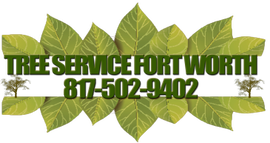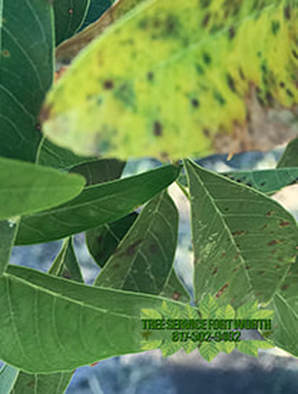Leaf Spot Treatment in Fort Worth, TX.
What Causes Leaf Spots to Appear?Frequently encountered by tree care specialists throughout Fort Worth neighborhoods is a disease known to certified arborists as leaf spot, which is a general term referring to a collective group of ailments that render trees or plants with dark unsightly spots covering the leaves. Leaf spot is most often triggered by numerous fungal pathogens as is the case in the diseases powdery mildew, anthracnose, and tubakia, but may also be caused by bacterial agents. Varieties of leaf spot diseases are so numerous that it is highly unusual not to ever experience this problem with your trees and plants! |
The common factor required for all forms of leaf spot is that the pathogens need wet, humid weather conditions as is typical during the spring season in North Texas. The fungus resides through the winter months on dead leaves, twigs and in infected soil and visibly manifests in early spring when brownish to black small dots no larger than 1/2 inch across begin covering diseased leaves. In some cases the number of spots is so extensive they overlay and appear as large blotches on the foliage. If left untreated, leaf spot will progress rapidly; therefore, it is of serious importance that an experienced tree company be contacted when you first begin to observe spots on the tree's leaves.
Diagnosing Leaf SpotsThe experienced plant pathologist will swiftly conduct diagnostic testing for leaf spot disease and examine the leaves and the outdoor environment. Leaves covered with dark spots surrounded by lighter-colored rings is a definitive indication of disease presence. Large blotches and brown dead areas on leaves is further confirmation of leaf spot invasion to arbor care professional. Severely infected trees will suffer premature foliage loss and develop an overall thinning appearance to the canopy. |
Wet soil favors rapid spread of this optically undesirable tree and plant pathogen and the grounds will be inspected for proper drainage, standing water and areas that are favorable hosts for the pathogen. Laboratory testing will be done on soil samples to isolate the fungal pathogen responsible for the leaf spot and to determine the proper care and treatment methods required. Upon completion of the diagnostic process, the best Fort Worth arborist will present the tree evaluation report and the immediate treatment process necessary to remedy the disease, as well as the on-going care and maintenance needed to prevent the spread of leaf spot throughout the residential outdoor environment.
Treating Leaf Spots
Infected or dead leaves and twigs must be professionally removed from the habitat by a tree service to prevent further spread of the destructive pathogen. Grounds must be kept clean and all fallen leaves raked and destroyed, as spores are quickly spread throughout the residential environment by winds and blowing or splashing rain. Regular tree pruning by an experienced tree company allows air to circulate throughout the tree's canopy and ensures that any infected leaves or twigs are quickly eliminated and leaf spot will not be able to further infest the tree or spread throughout the grounds. Sprinkler systems that render the foliage wet should not be used and scheduled and monitored watering are best done early in the day by soil drenching or at the base of the tree's trunk as determined necessary by a Fort Worth certified arborist. Maintaining healthy, virile trees is essential to increase their resistance to diseases and scheduled deep root fertilization administered by a tree service professional further supports the tree's immune system. Fungicide treatments may be deemed necessary in severe cases of leaf spot and should be applied and regularly scheduled by an arborist who treats sick trees and who also provides a one year warranty on any treatment. Although leaf spot disease is rarely deadly in and of itself, it does weaken the tree and cause it to be more prone to other invasive ailments. Ensure your residential habitat remains beautiful and disease-free by entrusting its care to the best arborist in Fort Worth, Texas!














